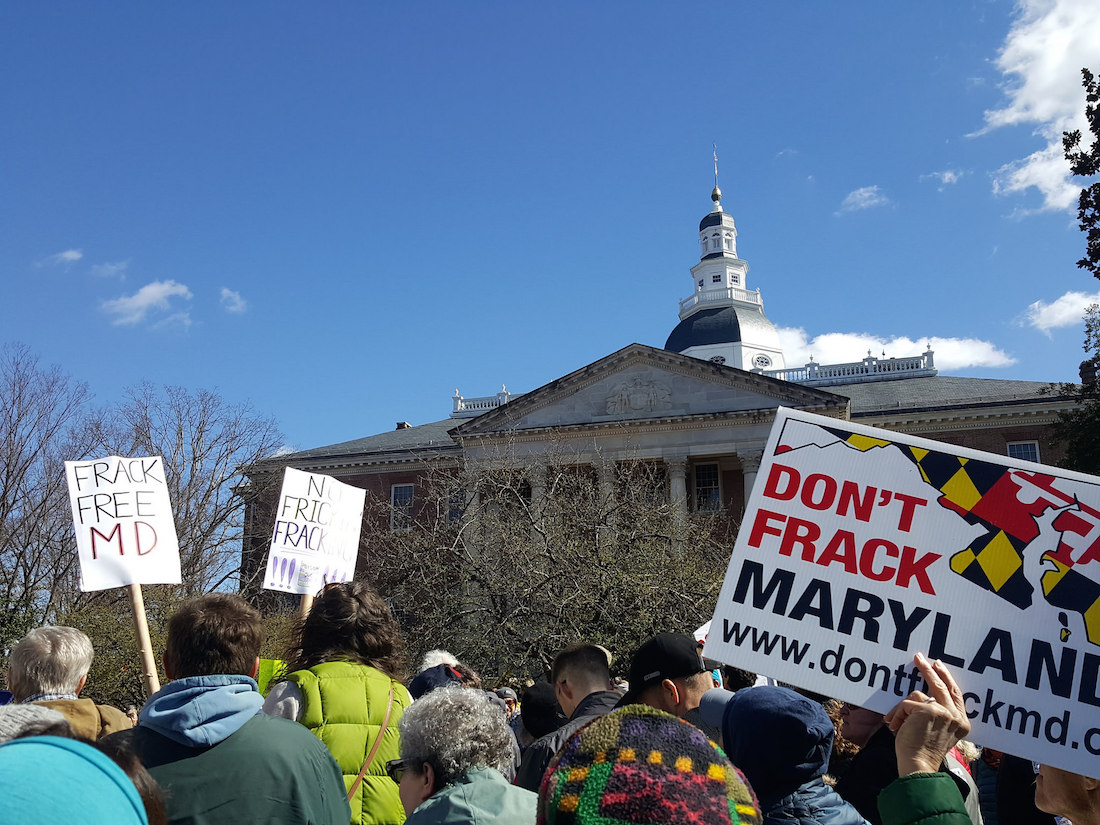In a historic vote Monday night, Maryland’s Senate passed a ban on hydraulic fracturing, or fracking — expected to be signed into law by the state’s Republican governor — making the state the third in the U.S. to reject the controversial technique. The 35–10 Senate vote came shortly after the state’s House of Delegates approved the ban in a 97–40 vote.
Crucially, the state’s governor, Republican Larry Hogan, recently announced that he was no longer convinced that fracking could be done safely if properly regulated and that a ban was necessary. Hogan said he will support the ban, making his state the first state with shale gas reserves to enact a fracking ban through legislation.
New York banned fracking in 2015, after a seven year review concluded the risks were too great and could not be adequately avoided, though that decision was made under Gov. Andrew Cuomo’s executive branch authority, not through the legislature. Vermont’s fracking ban was signed into law in 2012, but was mostly seen as symbolic as the state generally lacks shale gas reserves.
By passing the fracking ban, Maryland lawmakers rejected a proposal to simply extend the state’s moratorium on fracked well permits, scheduled to expire in October, by another two years.
“Science has spoken,” State Delegate Kumar P. Barve, head of the House environmental committee, told the Washington Post earlier this month, “and we should terminate this practice here in Maryland.”
For years, Don’t Frack Maryland, a coalition of environmental, public interest, faith, and business organizations, had campaigned for the ban, citing the litany of problems like flammable drinking water, earthquakes, and air pollution that the shale gas rush brought to other states.
“We have learned from and worked with our neighbors whose health has been compromised for years,” said Natalie Atherton of Citizen Shale, a member of Don’t Frack Maryland. “Already Citizen Shale is being approached by communities in other states, hoping to learn how they can ban fracking where they live. This has become a movement of people, and it won’t stop with Maryland.”
“We are relieved and overjoyed that the state Senate has said NO to fracking,” added Elisabeth Hoffman, Howard County Climate Action. “In Maryland, every email and phone call, every Facebook post and tweet, every meeting and march has led to this moment.”
The ban drew immediate national attention.
“Fracking is a danger to our water supply. It’s a danger to the air we breathe,” former presidential candidate Bernie Sanders said in a Facebook post yesterday. “Congratulations to Maryland for passing a ban on fracking!”
“Most importantly, on climate change, Maryland is now poised to keep a dangerous pool of fossil fuels in the ground forever,” said Chesapeake Climate Action Network executive director Mike Tidwell. “Scientists say this is what states across America and countries around the world need to do to solve global warming.”
Regulations Not Enough, Republican Governor Concludes
The ban comes just weeks after the state’s governor announced that he could no longer support fracking. “The possible environmental risks of fracking simply outweigh any potential benefits,” Gov. Hogan said at a March 17 news conference announcing his support for the ban.
“Our administration proposed the toughest fracking regulations of all 50 states,” the governor added. “The regulations that we proposed would have made it virtually impossible for anyone to ever engage in fracking in Maryland. However, the legislature has failed to enact these tough regulations. That’s why I’ve decided that we must take the next step and move from virtually banning fracking to actually banning fracking.”
The governor’s move was especially striking given that Maryland Republicans were one of the only groups in the state that supported fracking in a Washington Post–University of Maryland poll conducted last fall. Roughly two thirds of Independents and Democrats opposed fracking, but only one third of Republicans (generally a minority in the heavily Democratic state) opposed the process, with just shy of 50 percent indicating their support.
Nationally, polls show strong public opposition to fracking. A Gallup poll earlier this month found that 53 percent of Americans oppose fracking, compared to just 35 percent that support it (12 percent lacked an opinion) — a strong shift from 2015, when Americans were equally divided (40 percent pro, 40 percent opposed, and 19 percent without an opinion, Gallup reported).
“We commend the Maryland General Assembly for this bipartisan victory, and we thank Governor Hogan for his support,” said Sierra Club Maryland Chapter director Josh Tulkin in a statement, “but the real congratulations go [to] the thousands of people across the state, particularly those in Western Maryland, who stood up for their beliefs, who organized, lobbied, and rallied to get this legislation passed.”
The oil and gas industry condemned the state’s ban. “Denying Maryland consumers, businesses, and job-seekers the benefits that come with in-state energy production through hydraulic fracturing shuts the door on an important share of the American energy renaissance and western Maryland’s future economic growth,” Drew Cobbs, executive director of the Maryland Petroleum Council, told the Associated Press.
But many have questioned to what extent Maryland’s economy would have been impacted by drilling — especially given the potential harm to the state’s tourism and agricultural industries. “Obviously we’re opposed to [the ban],” Cobbs, told InsideClimate News. “Though probably more than anything else it’s a symbolic gesture since it’s only a small part of western Maryland that could be developed.”
The state had two counties — Garrett and Allegany — that had drawn the eye of drillers as the Marcellus shale gas rush struck the Eastern region of the U.S about a decade ago. Drillers leased over 100,000 acres in the state, but as Maryland’s moratorium kept fracking at bay, those leases began to expire.
“We are the only state in the nation that sits on shale gas that hasn’t put a drill in the ground,” former state delegate and gubernatorial candidate Heather Mizeur, who fought fracking in her state for seven years, told a crowd of hundreds at a demonstration at the state capital earlier this month.
“I never doubted once that this day would arrive,” she told the Baltimore Sun when Gov. Hogan threw his weight behind the ban. “I just didn’t think we’d have Larry Hogan standing next to us — a change of heart on the most meaningful of issues.”
States a Bulwark Against Trump’s Rollbacks?
The state’s ban came just before a major federal setback for the environment — one of many that have been dealt by the new Trump administration.
Earlier this month, President Donald Trump announced the federal government would drop the legal defense of rules for fracking on federal lands that were written by the Obama administration. He moved to unwind Corporate Average Fuel Economy (CAFE) fuel standards, bringing down the standards for gas mileage for U.S. cars and trucks, with massive impacts for U.S. greenhouse gas pollution. And the day after Maryland’s ban passed its Senate, Trump issued an executive order unraveling the country’s Clean Power Plan, a move expected to make it all but impossible for the U.S. to meet its obligations under the Paris climate agreement.
That last announcement was met with strong pushback from a coalition of 16 state attorneys general (plus the attorney general for Washington, D.C.) and top legal officers from 6 major metropolitan areas, including New York, Chicago, and Philadelphia, who said that they would fight the rollback in court.
“We won’t hesitate to protect those we serve — including by aggressively opposing in court President Trump’s actions that ignore both the law and the critical importance of confronting the very real threat of climate change,” they said in a joint statement.
But while states may represent a bulwark against federal reversals on the environment, state environmental regulators are expected to face massive cuts to federal funding. Under the budget announced by the Trump administration, state assistance would be slashed — and “more than half of state environmental agencies receive at least one-quarter of their funding from federal sources,” a Center for American Progress report recently concluded.
That means that states will have smaller budgets as they seek to police drillers and prevent accidents, illegal dumping, and other harmful acts, which adds fuel to the call for state-wide bans, activists say, because state regulations on the books designed to mitigate the worst impacts of drilling and fracking may become even less enforceable.
Like Gov. Cuomo before him, Gov. Hogan became persuaded of the need for a fracking ban after years of study convinced him that even the strongest state regulations would be insufficient to protect citizens.
“Governor Hogan’s support of a fracking ban in Maryland draws a stark contrast with several Democratic Governors who claim to have green credentials, but have been unwilling to listen to their constituents and stand up to the oil and gas industry,” said Wenonah Hauter, executive director of Food & Water Watch, citing Pennsylvania’s Tom Wolf and California’s Jerry Brown as examples.
“But with Republicans nationally denying climate change and several leading Democrats refusing to take meaningful action to leave fossil fuels in the ground, it’s critical that we continue to organize and build political power in legislative districts across the country to fight for what we really need for the future of the planet: A ban on fracking, rejection of related infrastructure, and a quick transition to 100 percent renewable energy future.”
On the heels of this victory, environmental groups are setting their sights on Florida next. In January, Republican lawmakers introduced bills calling for statewide bans, which drew bi-partisan support.
Maryland’s ban is expected to fuel that effort. “It says to Republicans: This is the direction we need to be going in,” Thomas Meyer, a Maryland Food & Water Watch organizer told The Baltimore Sun. “More importantly, it says to Democrats: You can’t call yourself a progressive on climate issues if you’re supporting fracking.”
Main image: Campaigners for a fracking moratorium in Maryland have pressed for years on this issue, as seen in this March 2017 photo. Credit: Chesapeake Climate Action Network, CC BY–NC–SA 2.0
Subscribe to our newsletter
Stay up to date with DeSmog news and alerts






